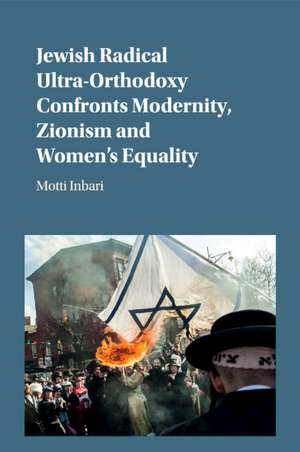Jewish Radical Ultra-Orthodoxy Confronts Modernity, Zionism and Women's Equality
Autor Motti Inbarien Limba Engleză Paperback – 27 mar 2019
Preț: 285.75 lei
Nou
Puncte Express: 429
Preț estimativ în valută:
54.68€ • 56.74$ • 45.71£
54.68€ • 56.74$ • 45.71£
Carte tipărită la comandă
Livrare economică 17-31 martie
Preluare comenzi: 021 569.72.76
Specificații
ISBN-13: 9781107458475
ISBN-10: 1107458471
Pagini: 273
Dimensiuni: 153 x 230 x 20 mm
Greutate: 0.4 kg
Editura: Cambridge University Press
Colecția Cambridge University Press
Locul publicării:New York, United States
ISBN-10: 1107458471
Pagini: 273
Dimensiuni: 153 x 230 x 20 mm
Greutate: 0.4 kg
Editura: Cambridge University Press
Colecția Cambridge University Press
Locul publicării:New York, United States
Cuprins
Introduction; 1. The de Haan assassination and the background to the formation of Neturei Karta; 2. Rabbi Amram Blau, founder of the Neturei Karta movement; 3. The modesty campaigns of Rabbi Amram Blau and the Neturei Karta movement, 1938–74; 4. Messianic activism in the work and thought of Rabbi Chaim Elazar Shapira (the Munkacser Rebbe) in the interwar period; 5. The life and work of Rabbi Yoel Teitelbaum, founder of the Satmar Hasidic court in New York; 6. Eschatology, dualism, and the decline of the generations - the world view of radical ultra-orthodoxy; 7. Jewish zealotry - past and present; Epilogue. Contemporary trends in radical ultra-orthodoxy.
Recenzii
'… Inbari's book stands as a major contribution to the literature on ultra-Orthodoxy and Jewish fundamentalism, an excellent introduction to and overview of a fascinating corner of the Jewish world.' Hadas Fischer, H-Net
'Inbari's book gives us a comprehensive and fascinating account of the ideological origins of some of the most significant radical ultra-Orthodox anti-Zionist movements, shedding new light on their fraught battle with modernity. Particularly illuminating is his use of new documents from Rabbi Amram Blau's personal archive.' Lihi Ben Shitrit, Politics and Religion
'There is nothing in this book that is not extremely interesting.' Reuven Firestone, Journal of Religion and Violence
'This is an important introductory work that serves to revive the sociological interest in Haredi society both in Israel and abroad. It joins Motti Inbari's other important studies, devoted to Rabbi Uzi Meshulam and his followers, the Temple Mount groups, and ultra-Orthodox radicals. Collectively, these works show Inbari to be an important scholar of the radical fringes of religious Jewish society and the ideologies supporting them.' Nissim Leon, Israel Studies Review
'His new book … will interest all students of modern Jewish religious history …' Marc Shapiro, AJS Review
'The book's strength is in the breadth of its vision, encompassing several significant developments in Haredi Judaism over the past century. … the book is a useful study of an important phenomenon and could be readily adopted by course instructors wishing to include accessible material on an important contemporary phenomenon in Judaism.' Ira Robinson, Nova Religio
'Inbari's book gives us a comprehensive and fascinating account of the ideological origins of some of the most significant radical ultra-Orthodox anti-Zionist movements, shedding new light on their fraught battle with modernity. Particularly illuminating is his use of new documents from Rabbi Amram Blau's personal archive.' Lihi Ben Shitrit, Politics and Religion
'There is nothing in this book that is not extremely interesting.' Reuven Firestone, Journal of Religion and Violence
'This is an important introductory work that serves to revive the sociological interest in Haredi society both in Israel and abroad. It joins Motti Inbari's other important studies, devoted to Rabbi Uzi Meshulam and his followers, the Temple Mount groups, and ultra-Orthodox radicals. Collectively, these works show Inbari to be an important scholar of the radical fringes of religious Jewish society and the ideologies supporting them.' Nissim Leon, Israel Studies Review
'His new book … will interest all students of modern Jewish religious history …' Marc Shapiro, AJS Review
'The book's strength is in the breadth of its vision, encompassing several significant developments in Haredi Judaism over the past century. … the book is a useful study of an important phenomenon and could be readily adopted by course instructors wishing to include accessible material on an important contemporary phenomenon in Judaism.' Ira Robinson, Nova Religio
Notă biografică
Descriere
An historical study of the culture and leadership of Jewish radical ultra-Orthodoxy in Hungary, Jerusalem and New York.
